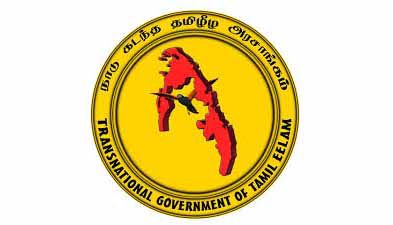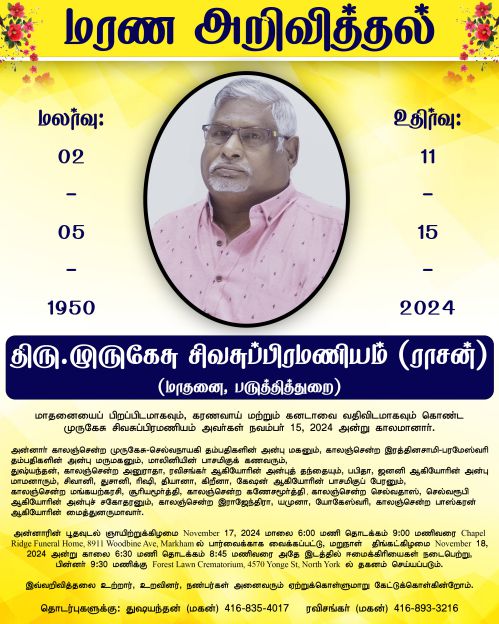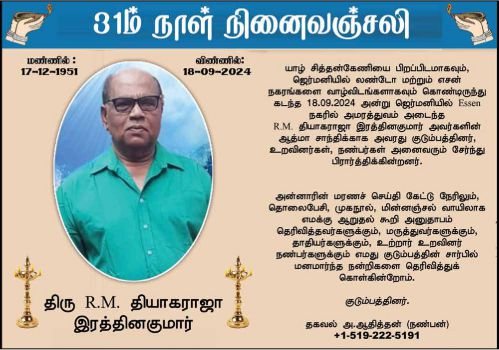China Should Withdraw Plans for Projects in Tamil Areas in Sri Lanka: TGTE
தமிழர் தாயகத்தில் சீனா மேற்கொள்ளும் திட்டங்களில் இருந்து முழுமையாக விலகிக் கொள்ள வேண்டும் என தெரிவித்துள்ள நாடுகடந்த தமிழீழ அரசாங்கம், எந்த திட்டங்களானாலும் தாயக மக்களிடமிருந்து வெளிப்படையான இசைவு பெற்ற பிறகே தொடங்க வேண்டும் என இடித்துரைத்துள்ளது.
இந்தியப் பெருங்கடலில் சீன வட்டத்தை விரிவாக்கும் ஆட்டத்துக்காகத் தமிழர் தாயகப் பகுதிகளை பலியிடவிடாது, தமிழர் தேசமும், தமிழர் அரசியல் தலைமைகளும் தமது அரசியல் இறையாண்மையினை செலுத்த வேண்டும் என நாடுகடந்த தமிழீழ அரசாங்கத்தின் பிரதமர் வி.உருத்திரகுமாரன் கோரியுள்ளார்.
இது தொடர்பில் நாடுகடந்த தமிழீழ அரசாங்கம் வெளியிட்டுள்ள அறிக்கையில் தெரிவிக்கப்பட்டுள்ளதாவது,
இலங்கைத்தீவின் தமிழர் தாயகப்பகுதியின் வட புலத்தே, புதுப்பிக்கத்தக்க ஆற்றல் இயற்றும் மின்சக்தி திட்டத்தை தற்காலிகமாக நிறுத்திக் கொள்வதாக அறிவித்துள்ள சீனா, இந்த முடிவுக்கு ‘மூன்றாம் தரப்பின் பாதுகாப்பு’ காரணமென கூறியுள்ளது. சீனாவின் இந்த முடிவு வரவேற்கத்தக்கது எனினும் தமிழர் தாயகத்தின் சீனா மேற்கொள்ளும் திட்டங்களில் இருந்து முழுமையாக விலகிக் கொள்ள வேண்டும்.
போருக்கு பின்னராக ஆக்கிரமிப்புக்கு உள்ளாகியுள்ள தமிழர் தாயக பகுதிகளில் தொடங்கப்படும் திட்டங்கள் எதுவானாலும் அம்முயற்சிக்கு தாயக மக்களிடமிருந்து வெளிப்படையான இசைவு பெற்ற பிறகே தொடங்க வேண்டும். இசைவு என்பது திட்டங்களின் அரசியல், பொருளியல் கூறுகளுக்கு மட்டுமன்று, நம்பகமான பன்னாட்டு அமைப்பொன்றின் சூழலியல் மதிப்பாய்வின் ஊடாகச் சூழலியல் கூறுகளுக்கும் இசைவாக முன்னெடுக்கப்பட வேண்டும்.
சீன நிறுவனங்களுக்கு திட்டங்கள் வழங்குவதன் மூலம் இந்தியாவைச் சுற்றிவளைக்கவும் அடக்கி வைக்கவும் சீனாவுக்கு உதவும் சிறிலங்காவின் நகர்வுகள் தமிழர் இறையாண்மை மீது நெடுந்தாக்கத்தினை ஏற்படுத்தும். வட புலத்தே யாழ் குடா நாட்டையும் இந்தியாவின் தமிழ்நாட்டையும் பிரிக்கும் குறுகலான பாக்கு நீரிணையில் அமைந்த சிறு தீவுகளான நெடுந்தீவு, அனலைத்தீவு, நைனாத்தீவு ஆகிய இடங்களில் புதுப்பிக்கத்தக்க மின்சக்தி நிலையங்களை நிர்மாணிப்பதற்கு சைனோ சர் ஹைப்ரிட் டெக்னாலஜி என்ற சீன நிறுவனத்துக்கு வழங்கப்பட்டுள்ளன.
சிறிலங்காவுக்கான சீனத் தூதரகம் ‘மூன்றாம் தரப்பு’ எதுவென்று சொல்லா விட்டாலும் அது இந்தியாதான் என்று நம்பப்படுகிறது. அந்தச் சிறு தீவுகளில் இந்திய நிறுவனமான அதானி குழுவுக்கு 12 மில்லியன் அமெரிக்க டொலர் மதிப்புள்ள திட்டப் பணியை வழங்கும் ஒப்பந்தத்தை கடந்த பெப்ரவரியில் கொழும்பு நீக்கம் செய்து, அதனை சீன நிறுவனத்துக்கு வழங்கிய போது, இந்தியா தனது பாதுகாப்பு சார்ந்த கவலைகள் தெரிவித்தது.
இந்திய நிறுவனத்தின் முயற்சியை சீனம் கீழறுத்த செயல் அந்த நேரத்தில் சிறிலங்காவில் தன் நலன்களைக் காத்துக்கொள்வதோடு அண்டை நாடுகளோடு இந்தியாவுக்குள்ள உறவுகளைக் கெடுக்கவும் கிழக்காசிய நாடாகிய சீனத்துக்குள்ள வல்லமையாகக் கருதப்பட்டது.
கொழும்புத் துறைமுகத்தில் கிழக்குப் முனையத்தின் இரண்டாம் கட்ட வளர்ச்சிக்கு இந்தியாவுடனும் ஜப்பானுடனும் செய்த ஒப்பந்தத்தை சிறிலங்க அதிபர் கோத்தபய ராஜபக்சே, பெய்ஜிங்கின் தூண்டுதலால் முறித்துப் போட்டதாகச் செய்தி வந்த நேரத்தில் அந்தச் சிறு தீவுகளில் புதுப்பிக்கத்தக்க மின்சக்தி திட்ட நிலையங்களை நிர்மாணிக்கும் முன்மொழிவு பிறந்தது. இந்தியாவுடனும் ஜப்பானுடனும் செய்த ஒப்பந்தப்படி கிழக்குப் முனையத்தில் சிறிலங்காவின் துறைமுகப் திணைக்களத்துக்கு 51வீத பங்குகள் இருக்கும். இந்தியாவுக்கும் ஜப்பானுக்கும் 49வீத பங்குகள் இருக்கும் என கூறப்பட்டிருந்தது.
இந்தத் திட்டத்தை நிறைவேற்ற சிறிலங்கா மறுத்தன் காரணம் என்ன ?சீன நிறுவனங்களை வளர்த்தெடுக்கும் வசதிகளையொட்டி முனையத்தை நடத்துவதில் தன் புவிசார் அரசியல் போட்டி நாடுகளான இந்தியாவும் ஜப்பானும் எவ்விதப் பங்கும் வகிக்க விடாமல் தடுக்க பெய்ஜிங் அழுத்தம் கொடுத்ததாலேயே கிழக்குப் முனையத்தை வளர்த்தெடுக்கும் திட்டத்தை நிறைவேற்ற சிறிலங்கா மறுத்ததாக பரவலாக நம்பப்படுகிறது. இந்தியாவும் ஜப்பானும் அமெரிக்காவின் நெருங்கிய தோழடமை நாடுகள். நாற்கூட்டுப் பாதுகாப்பு உரையாடல் (குவாட்) பங்காளிகள. ஆனால் நாட்டின் சொத்துகளை அயல் நாடுகளுக்கு விற்கத் தொழிற்சங்கங்கள் எதிர்ப்புத் தெரிவித்ததைக் காரணமாகக் காட்டியே சிறிலங்கா இந்தப் பேரத்திலிருந்து விலகிக் கொண்டது. சிங்கள மக்களும் இந்திய மக்களும் பண்பாட்டுறவு என்றும் சிறிலங்கா இந்தியாவின் நட்பு நாடு என்றும் தம்பட்டமடிக்கும் கொழும்பின் நிலையினை இந்த விலக்கல், அதன் உண்மை முகத்தை வெளிச்சம்போட்டு காட்டியது. 2019 மே மாதம் செய்த மூல உடன்பாட்டை மதித்து நடக்கும்படி கொழும்பைக் நியூ டெல்லி கேட்டுக் கொண்டது.
திட்டங்கள் தொடர்பாக இந்தியாவுக்கு அளித்த உறுதிப்பாடுகளிலிருந்து விலகிக் கொள்ளும் ராஜபக்சேயின் நகர்வு, இந்தியாவின் முன்னாள் பாதுகாப்பு அமைச்சர் ஜோர்ஜ் பெர்னாண்டஸ் தெரிவித்த கருத்துக்களை மீளுறுதி செய்கிறது. 1998இல் பெர்னாண்டஸ் கூறினார் : ‘சீனா எதிர்காலத்தில் முதலாம் எண் அச்சுறுத்தலாகும்…. இடைக்கால நோக்கிலும் நெடுங்கால நோக்கிலும் இந்தியாவுக்கு முதன்மையான பாதுகாப்பு அச்சுறுத்தலாக இருந்து வரவே வாய்ப்புண்டு. சீனத்தின் அச்சுறுத்தல் பாகிஸ்தானின் அச்சுறுத்தலை விடவும் பெரிது. இந்தியாவின் பாதுகாப்பு பற்றிக் அக்கறை எவரும் இந்தக் கருத்தை ஏற்கத்தான் வேண்டும்.’
மேற்கே பாகிஸ்தானில் குவாதர் தொடங்கி கிழக்கில் கோக்கோ தீவுகள் வரை இந்தியா மீதான கடல்சார் சுற்றிவளைப்பானது தெற்கே சிறிலங்காவில் பெய்ஜிங்கின் வளரும் செல்வாக்கினால் முழுமையடைகிறது. இந்தியப் பாதுகாப்புத் துறையைச் சேர்ந்த பேராசிரியர் மோகன் மாலிக் கூறியது போல், ‘இந்தியாவின் பால் சீனத்தின் மூலோபாயம் என்பது சுற்றிவளைத்தல், மூடியடைத்தல், சிக்கவைத்தல் ஆகிய மூன்று கூறுகளைக் கொண்டது.’ 2017ஆம் ஆண்டு தெற்கிலங்கையில் இந்தியப் பெருங்கடல் கடற்போக்குவரத்து வழிகளையொட்டி அமைந்த அம்பாந்தோட்டாவில் சீனம் கட்டிய துறைமுகத்தை பெய்ஜிங்கிடம் 99 ஆண்டுக் குத்தகைக்குக் கொழும்பு ஒப்படைத்தது. 2014ஆம் ஆண்டு கொழும்புத் துறைமுகத்தில் சீன நீர்மூழ்கிக் கப்பல் நிறுத்தப்பட்ட போது புது டெல்லி வன்மையாக எதிர்த்திருந்தது.
இலங்கையின் வட கடலோரத்தில் யாழ் குடாநாடும் அதன் கடற்பகுதியில் அமைந்த சிறு தீவுகளும் தொன்றுதொட்டுத் தமிழர்களின் கட்டுப்பாட்டில் இருந்து வந்துள்ளன. ஆக, அவை தமிழர் தாயகத்தின் பிரிக்க முடியாத பகுதியாகும். மேலும், இலங்கைத் தீவின் தமிழர் தாயகம் பகுதியும் அதையொட்டிய கடற்பிராந்தியம் தமிழர் இறைமைக்கு உட்பட்டவை. இதனை உறுதி செய்திடத் தமிழர் தேசமும், தமிழர் அரசியல் தலைமைகளும் தமது அரசியல் இறையாண்மையினை செலுத்த வேண்டும் என நாடுகடந்த தமிழீழ அரசாங்கம் தெரிவித்துள்ளது.
China Should Withdraw Plans for Projects in Tamil Areas in Sri Lanka: TGTE
China suspended its renewable hybrid energy project on the islets off Tamil-majority northern Jaffna Peninsula in the island of Sri Lanka in early December, citing “security concerns from a third party.
While this is a welcome move, China should withdraw entirely from development projects in the Tamil areas, said Mr. Visuvanathan Rudrakumaran, Prime Minister of Transnational Government of Tamil Eelam (TGTE).
“Any future development project initiated in the Tamil areas should only be done after explicit consent is obtained from the people of the North East for the undertaking. Consent should not only be for political and economic aspects of development projects, but on environmental features as well, through an environmental impact assessment by a credible international body.”
“Sri Lanka’s moves assisting China to encircle and contain India by awarding Chinese companies development projects will have a lasting impact on Tamil sovereignty. The renewable energy project awarded to the Chinese company Sino Sar Hybrid Technology were in Delft, Analativu, and Nainativu, which are islets in the narrow Palk Strait that divides the Tamil-majority Jaffna Peninsula and India’s Tamil Nadu.”
Although the “third party” was not named by the Chinese embassy in Sri Lanka, it is believed to be India. India voiced security concerns in February when the Colombo revoked the agreement to develop US $12 million worth project on the islets with the Indian firm Adani Group and awarded it to the Chinese company. Under terms of the agreement, the project was to be developed jointly by the Chinese company and the Ceylon Electricity Board. China undercutting the Indian company’s bid was seen at that time as the East Asian nation’s power not only to secure its interests in Sri Lanka but also undermine New Delhi’s relationship with its neighbours, said Mr. Rudrakumaran.
“The proposal to install a renewable energy project on the islets came as Sri Lanka President Gotabaya Rajapaksa’s government rescinded a contract with India and Japan, reportedly on Beijing’s instigation, for second phase development of the Eastern Container Terminal (ECT) at the Colombo Port. Under the agreement with India and Japan, the Sri Lanka Ports Authority was to own 51% shares in the ECT, while India and Japan would hold 49%.”
Sri Lanka’s refusal to go ahead with the project to develop the ECT is widely seen as pressure from Beijing to prevent its geopolitical rivals in the region, India, and Japan – both close U.S. allies and partners in the Quadrilateral Security Dialogue (QUAD) – having any part to play in running of the terminal, which is adjacent to facilities being developed nearby by Chinese companies. Sri Lanka however cited objections by trade unions to sell the country’s assets to foreign countries as the reason to withdraw from the deal. The ostensible reason shatters the often-trumpeted assertion by Colombo that the Sinhala people are culturally related to the Indian people and Sri Lanka is a friendly country of India’s. India protested the move and asked Colombo to honour the original agreement of May 2019.
The move by the Rajapaksa to withdraw from commitments to India on development projects reinforces the concerns of former Defence Minister of India, George Fernandes who stated in 1998 that “China is potential threat number one . . . China is and is likely to remain the primary security challenge to India in the medium and long-term . . . The potential threat from China is greater than that of Pakistan and any person who is concerned about India’s security must agree with that.”
The maritime encirclement of India from Gwader in Pakistan in the West to Koko Islands in the East, is complete with Beijing’s growing influence in Sri Lanka, which is South. As Professor Mohan Malik of Indian Defence said, “China’s strategy towards India have three elements namely encirclement, envelopment, and entanglement.” In 2017 Colombo handed over a Chinese-built port in Hambantota, which is in southern Sri Lanka and adjacent to the Indian Ocean shipping lanes, to Beijing on a 99-year lease. In 2014, a Chinese submarine berthed in the Colombo port provoking strong protests from New Delhi.
The Jaffna Peninsula on Sri Lanka’s northern coast and the islets off its shoreline, are part of the territory that has been under the control of the Tamils from ancient times. As such, they are an integral part of the Tamil homeland. Furthermore, the Northeastern part of the Island and the adjacent seas fall within the purview of Tamil sovereignty. Tamils and their political leadership should exercise their sovereignty and their right to self-determination more forcefully to ensure that Colombo does not sacrifice parts of the Tamil homeland in its game to broaden Chinese orbit in the Indian Ocean.



































